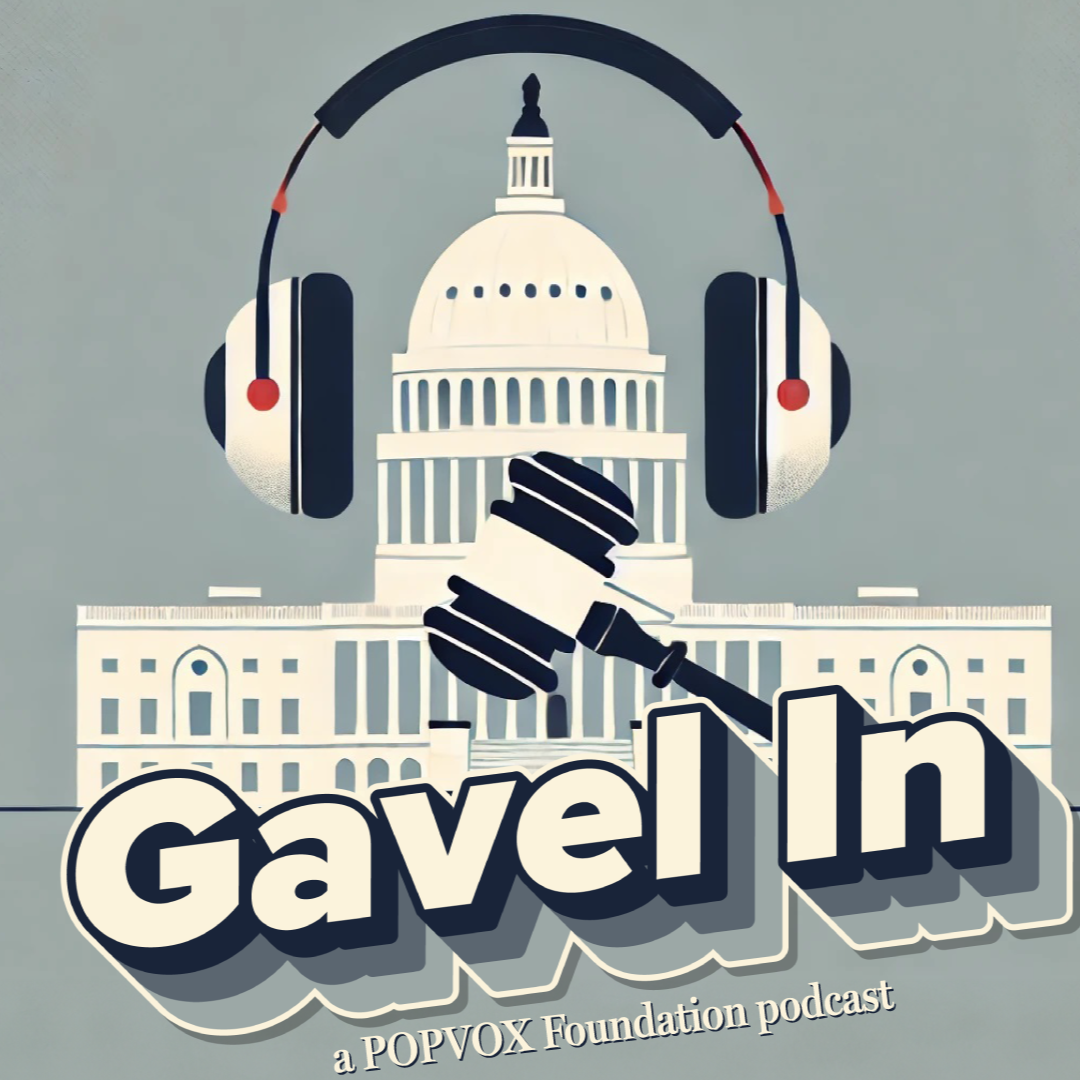Future-Proofing Congress: Wrapping up the 118th and Resources for the 119th
Welcome to POPVOX Foundation’s “Future-Proofing Congress,” a monthly newsletter for busy Congressional staffers featuring tech tools, modernization updates, and professional development opportunities.
This month, we’re covering:
“Gavel In,” a new Congressional explainer podcast from POPVOX Foundation,
How Congress compares to other legislatures in AI adoption,
House Digital Services’ new “SocialStats,”
Resources for navigating Congressional career transitions,
Security tips for Members Elect and incoming staff of the 119th, and more!
With New Member Orientation winding down and the 119th Congress in our sights, we extend a warm welcome to Members-elect and new staffers. And for those on the search for a new job, be sure to upload your info to the House Resume Bank and keep this blog from our archives bookmarked. Now is a great time to take advantage of institutional resources such as House HR Hub, the Congressional Staff Academy, Congressional Excellence Program, and the Chief Administrative Officer’s Coach Program for upskilling, leadership development, and technical know-how.
And if your colleagues in casework and constituent services don’t yet subscribe to Casework Navigator, you’re going to want to join the list ASAP as it’s full of great advice on preparing for the new year and the new Congress.
My colleague Aubrey Wilson is currently out on maternity leave (congrats, Aubrey!), so it’s just me providing the updates this month. As recovering staffers from both sides of the aisle, we’ve been in your shoes, trying to keep up with all that’s happening while also staying current on how Congress works. Our goal is to make your life easier. Got any updates you would like folks to know? If so, please don’t be shy about reaching out if you have any questions or suggestions on how we can improve this newsletter.
Warmly,
Taylor J. Swift
Director of Government Capacity
“Gavel In” Podcast Explains How Congress Really Works
POPVOX Foundation just launched “Gavel In,” a limited-run explainer podcast series designed especially for new Members-elect and staff. But, to be honest, there is a lot in there that even seasoned Congressional veterans will find useful.
Over ten episodes, Aubrey and I glean LOTS of wisdom from a bipartisan mix of current and former Members of Congress, Chiefs, and experts who share their lessons and lifehacks for adjusting to life in Congress. Topics include:
How a bill really becomes a law
First hires and finding the right staff
Understanding the MRA and spending it wisely
Congressional Rules and why they matter
Being an effective committee member
Conducting oversight
Building rapport across the chamber
Tech and training resources
Gavel In
Gavel In is available on most streaming platforms including Apple, Spotify, Pocket Casts, and more. If you have friends or colleagues in new Member offices, encourage them to listen!
Congressional Management Foundation Updates “Setting Course”
A great companion to “Gavel In” is “Setting Course,” the definitive guide to setting up and managing a Congressional office from the Congressional Management Foundation (CMF). Now in its 40th year of publication, CMF just released an updated, nineteenth edition that:
provides new Members and key transition staff guidance on critical decisions they face in November and December,
helps new and veteran Members chart a path to success within the institution and become effective leaders, and
offers guidance to Members and staff on managing critical office functions: planning, budgeting, staff and constituent communications, scheduling, and ethics.
Request a copy by contacting cmf@congressfoundation.org.
AI on the Hill
CAO AI Policy Guidance Update and Comparing AI Adoption in the US Congress to Legislatures Worldwide
House staffers can now access the new House Information Technology Policy 08.0 (HITPOL 08.0) guidance on Artificial Intelligence on House Net. As watchers and fans of the House’s proactive approach to AI over the past year, we think the most important element of this new policy is an underlying framework that will be updated yearly. And we have lots of suggestions for the next update — including ensuring that Members and staff can use major platforms like Anthropic Claude, Grok.ai from X, Google Gemini, Perplexity.ai, Microsoft Copilot, and Meta’s Llama.
AI and Smart Approps Language Recovers $4 Billion
Here's a really good example of Congress fixing a big problem with a small language insertion into an appropriations bill. In this case, Congress gave the IRS access to the “Do Not Pay” database of dead people…so the IRS used AI to not pay them, saving over $1 billion. The IRS says over $4 billion in fraudulent and improper payments was prevented in FY 2024, in large part due to AI tools.
New GAO Report on GenAI
In the second of a series of reports examining the impact of AI, the Government Accountability Office analyzed how commercial model developers “red team” for potential vulnerabilities and attempt to protect their models from prompt injection attacks, jailbreaks, and data poisoning.
Speaking of the GAO, did you know that for every $1 invested in GAO in FY2024, Congress and taxpayers saved $76?
AI and Constituent Communications
POPVOX Foundation is working on a project examining the impact of AI tools on constituent communication, and is looking to talk to staff off the record about the current level of mail in the wake of AI tools and how offices are responding. Reach out to anne@popvox.org to schedule.
CAO’s House Digital Services Builds SocialStats for Comms Staff
Proof that good things do come to those who ask: CAO recently unveiled SocialStats, an app to help comms staffers more easily track and compare social media engagement, including:
total follower counts,
daily number of posts,
engagement scores,
changes in these metrics over time, and
how their office compares in these metrics to other offices in their party, state, and House at large.
No more manual tracking! According to House Digital Services, the idea for SocialStats came from staffers who pitched the idea during an HDS listening session. (And can we just take a moment to appreciate how great it is to go from listening to action to actual benefit to staff in a few short months!)
Advancing House Rules
A broad group of civil society organizations and Congressional scholars encouraged Congressional leadership to consider four changes to the House Rules in the 119th Congress to advance Congressional capacity, namely:
changing the House schedule,
adopting the BUDS resolution (allowing two original bill sponsors),
establishing bipartisan committee retreats, and
examining provisions regarding the continuity of Congress.
Their letter to House leaders earned the attention of The Washington Post’s Paul Kane, who also covered several other Rules reform ideas from anonymous staffers like eliminating food at most meetings in the Capitol. Current Members put forward a few Rules updates that echo the recommendations by the Fix Congress cohort: change the calendar and facilitate more bipartisanship.
In our September issue, we discussed ideas for updating House Rules, including a proposal to allow House Members to vote by proxy or remotely while on paternity, maternity, or bereavement leave — a recommendation we’ve put forward for the 119th Congress.
Like a “Shark Tank” for legislation. Rep. Elissa Slotkin [D, MI] receives end-of-term pitches from office interns on a bill they believe she should cosponsor. (Photo via @RepSlotkin on X)
Security Tip of the Month
Last week, it was reported that an adversary hacked into the Library of Congress and was able to access emails sent between January and September of this year. Congressional offices were notified, but this is just another reminder of the importance of being cyber-secure and careful about what is being shared electronically.
As you know, staffers are required annually to take cybersecurity training. But earlier this year, it was reported that 3,000 staffers have had their information exposed on the dark web. As millions of Americans — and many of you! — plan to travel ahead of the Thanksgiving holiday, it’s important to practice cybersafe best practices while on the road:
Turn on 2-factor authentication
Use VPN when possible and be wary of joining public wifi networks on sensitive devices
Use complex passwords for all of your devices
Update software when required
Be aware of phishing and smishing scams - it’s estimated that 3.4 billion phishing emails are sent every day!
As always, you can reach out to House Tech or the House Sergeant at Arms with immediate cybersecurity concerns.
The Comparative View - Inspiration from Parliaments Around the World
Our team took an in-depth look at two new reports from Inter-Parliamentary Union (IPU) and the Law Library of Congress chronicling how parliaments worldwide are leveraging AI in their operations. These analyses (yes, even the one from the LOC) notably exclude an assessment of the US Congress, so we attempt to fill those gaps. Our report finds that the US Congress started out strong in 2023, but has not followed its initial momentum with investments in training, testing, and prototypes. We hope the examples from other legislatures will inspire fresh perspective for future iterations of the guidance to prioritize Member empowerment and helping Congress work better for the American people.
For more news on international legislative experiences, please subscribe to our Modern Parliament (“ModParl”) newsletter.
Stay in the Game
As the 118th Congress comes to a close, it’s a good time to assess what job skills you might want to strengthen to start 2025 strong. Keep sharp with the Congressional Staff Academy, which offers a variety of training opportunities for House staff and interns, including some taught by other Leg branch agencies including CRS and GAO. Visit the House intranet at registerme.house.gov for more information on current course offerings or contact the CSA at 202-226-3800 or StaffAcademy@mail.house.gov.
Have a favorite self-care tip you’d like to share? Email us!
Shout Outs & Events
Rep. Stephanie Bice [R, OK] and Rep. Bryan Steil [R, WI] describe their work to “Make Congress the ‘People’s House’”
Congratulations to Rep. Derek Kilmer [D, WA] for his upcoming role at the Rockefeller Foundation with the newly created US Program & Policy team
Elle gets the scoop on the Dem Chiefs group chat
Legistorm examines how parties differ on pay for junior and senior staff
POLITICO profiles the “wave of crypto-friendly lawmakers” headed to Congress
Incoming DOGErati Vivek Ramaswamy and Elon Musk lay out their vision for the outside advisory effort in the Wall Street Journal and launch a podcast
The New York Times explores Elon Musk’s many gov-related lines of business
Federal News Network examines the long history of “DOGE”-like (“Department” of Government Efficiency) efforts
The Foundation for American Innovation and the Antonin Scalia Law School’s C. Boyden Gray Center for the Study of the Administrative State just published papers from a symposium on how the overturning of the Chevron deference impacts Congress
The Future is Now
New “AI Conflict Mediator” from Google DeepMind attempts to help people with opposing viewpoints understand each other
More on the future of the .io domain
Information overload? According to a new study, open government data may make people feel less empowered.
Franklin De Vrieze of the Westminster Foundation on Democracy says legislatures must modernize to avoid AI-induced executive dominance.
An autonomous AI chatbot connected to X (with a backstory we are not even going to attempt to explain) inspired a cryptocurrency and is now worth hundreds of millions of dollars.
The US military is testing an AI-powered “autonomous robotic gun system” called the "Bullfrog," which can target small drones.
About POPVOX Foundation
POPVOX Foundation is a 501(c)3 nonprofit organization with a mission to inform and empower people and make government work better for everyone. POPVOX Foundation is focused on ensuring that democratic institutions are equipped to address the “pacing problem” — the gap between emerging technologies and governance.




